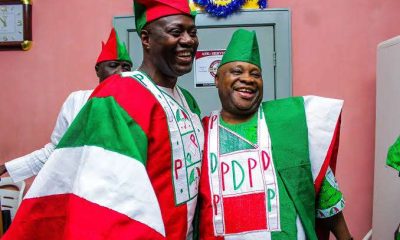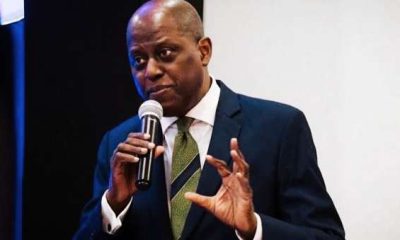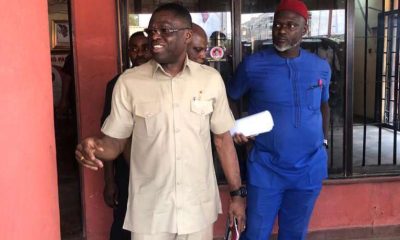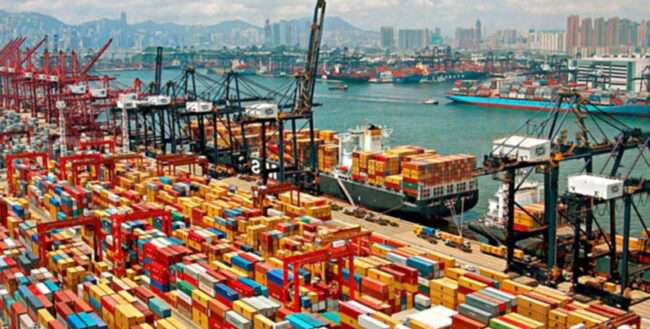Headlines
COVID-19: Expert flays FG policy on economy

- Price control is half the palliative for the poor – Dr Bongo
By Julius Alagbe
With the growing intensity of the effects of the Covid-19 pandemic in the country and government’s panic measures to rescue the economy, experts are worried that we may be applying the wrong measures to the situation which could create far more serious problems in the future. The lockdown of the economy which was never anticipated by the government had compounded and complicated the emerging economic situation in the country as business activities have been ground to a halt.
A McKinsey consulting report issued last week on the economy said Nigeria should expect a 3 per cent recession after this lockdown, which is almost double those of 2009 and 2016 at -1.6 and -1.8 respectively. Oil price is at its lowest levels since 2009 at $24 per barrel as the supply war between Russia and Saudi Arabia continues apace.
The Presidential Committee on economic sustainability said after a meeting with President Buhari that the economy is a dire situation stressing that options are running out. Members of the committee include the finance minister, Mrs Zainab Ahmed, Central Bank of Nigeria, governor, Mr, Godwin Emefiele, Group GMD of NNPC, M. Mele Kyari, minister of state for petroleum, Mr Timipre Silva etc.
Prices of good and services have skyrocketed with the measures being taken by the government to tackle the pandemic but especially since the lockdown. Food prices have been on the increase, rising by as much as 25% in the early day of economic lockdown even though there is no respite in view.
As part of the palliatives, the government had reduced the pump price of fuel from N145 to N125 per litre promising a further review by April 1, 2020. However, the expected review was just N2 reduction from N125 to N123 per litre. But labour and the main opposition party, the PDP, have called for a further reduction, insisting that the actual rate should be at N90.
Announcing a string of palliatives during a nationwide broadcast on March 28, President Buhari “directed that a three-month repayment moratorium for all TraderMoni, MarketMoni and FarmerMoni loans be implemented with immediate effect.
He also directed that a similar moratorium be given to all Federal Government funded loans issued by the Bank of Industry, Bank of Agriculture and the Nigeria Export-Import Bank.
“For on-lending facilities using capital from international and multilateral development partners, I have directed our development financial institutions to engage these development partners and negotiate concessions to ease the pains of the borrowers.
“For the most vulnerable in our society, I have directed that the conditional cash transfers for the next two months be paid immediately. Our internally displaced persons will also receive two months of food rations in the coming weeks,” he further said.
The CBN governor had earlier announced some stimulus measures such as the N3.5 billion package for industries and another N1.5 billion for infrastructure projects by the government, and suspension of interest payments on all its intervention loans.
However, Dr Bongo Adi, a Neo-Keynesian Monetary Theory expert and senior lecturer at Lagos Business School said the government should consider price control at this point to save the economy and the people from what may be stag-inflation – which is economic stagnation or recession and hyperinflation as was the case in the early 1970s after the oil embargo by the Gulf states in 1973.
He made the statement at “Staying Safe Series”, organised by Better Civic International Foundation (BCIF), last week. He said the greatest danger to the world economy and ours in Nigeria right now is the pandemonium created by COVID-19. According to Dr Bongo, this is an unusual economic and financial calamity of the sort referred to as a “black swan”.
He said the ugly thing about this current situation is that it is not a static, one-off event unlike other economic and financial distress we have witnessed.
“Here we have a situation that is still unfolding, dynamic and to a very large extent, intractable”. Everybody is paranoid with fear, apprehension and uncertainty. As a result, demand has suddenly outstripped the supply of many commodities to that deadly racketeering that thwarts every economic policy”, he said.
Dr Bongo explained that producers of staples have been turned into monopolists overnight.
“They have no other incentive than to jerk up their prices. Panic buying begets price gauging”, he elaborated.
He explained that the market system collapses under the heavyweight of panic behaviours.
“Left to its own devices, producers or suppliers of few essential commodities whose elasticity have suddenly become 0 – morph into blood-sucking witches. This is the classical market failure”, he added.
Dr Bongo explained that the sixth principle of economics is the market is a good way to organize economic activities, adding that the seventh qualify it that government can sometimes improve the market outcome.
“I had expected Buhari, in his speech, to bear his fangs by unleashing the dogs of price control. This would have been half the palliative the poor and vulnerable need under this unfolding “day of the jackals.”
He stated that without government intervention, there is going to be the massive distortion of the market and the poor will expectedly die of starvation.
“Price control should be primary on the government’s intervention mechanism at this time”, he emphasised.
This may explain the adoption of ‘market schools’ by the Lagos state government where goods are sold directly to the people at fairly controlled prices. The rotational markets which hold in a different school in the state on different days of the week are intended to save the people from monopolistic price manipulations.
Related to panic is the Keynesian “paradox of thrift,” a situation where everyone is holding tight to the little or huge savings they accumulated and no one is willing to spend on non-essential, he said.
“This is a circular behaviour – everyone behaves the same. As a result, we have the recipe for a recession. With spending down, inventories accumulate in firms, margins disappear with revenue fall, jobs evaporate and we all come home to roost.
“Four weeks of quarantine will throw us all out of the economy – the firm, the household and the individual. No argument about this”, he added.
He held that the situation has unmasked Nigeria’s wretchedness in health policymaking and disaster preparedness.
“No hospitals, no ventilators, no beds, no drugs, no doctors, no nurses…We will need to equip as many hospitals if we are to save 2% of what Italy has managed to save”, the scholar added.
He explained that if private citizens do not step up their philanthropic gestures, many of us will contract the virus and die in our homes and on our beds.
“This is a simple truth because the social distance thing is not working; contact tracing cannot work and handwashing with running water is a contradiction with the level of our infrastructure”, he said.
However, Dr Bongo listed indirect consequences of the pandemic to include supply chain disruption, evaporation of current account, the funeral of the Naira and debt burden.
Supply-Chain Disruption
Bongo said with border closures and quarantines, many or most businesses have all but gone into hibernation. The Economist at LBS said as a service-based economy dominated by trade, China has been our largest trading partner, and its lockdown virtually lockdown our economy before we actual lockdown by our government.
“Now, we can’t get things from them. Many inputs to production cannot also come as a result of the controls. Many industries in Nigeria will be facing bankruptcy in the next few months”, he noted.
He, however, recognised that some government policies seem to have anticipated this situation. He mentioned the 41 item ban and the encouragement of backward integration and import substitution.
“This means that for many FMCGs, the situation would not be that bad. Agriculture will not be affected. This is one of the reasons I think the government needs to be very draconian in controlling prices as a temporary palliative”, he stressed.
He further stated that real estate is going to be badly hit.
“Note that the economy had started showing signs of life beginning from late last year and realtors became very bullish. Except they leveraged equity and patient capital, the situation is going to be quite dire.
“Banks and financial institutions are already in a very bad situation – no need to elaborate as that would be flogging a dead horse”, he remarked.
Bongo said as a result of supply-chain disruptions, we are going to have unsold barges of oil.
“I read somewhere today that 70 barges of Nigeria’s oil are without buyers even when government discounts at $5. The fear right now is that should oil price decline further – which is likely if U.S, Saudi Arabia and Russia begin to struggle with their domestic COVID-19 conflagration – Nigeria will be left in tatters.
“Our cost of production is $17/b. If oil falls to $20, there is doubt that the International Oil Companies (IOCs) would be incentivised to go off-shore.
“But that is the least of our worries”, Bongo explained. He said the bigger pain is that gas comes from oil production as “associated” gas. So, if there is no production of crude, we may also be saying bye-bye to “NEPA”.
“Our generation companies (GENCOS) prioritized combined-cycle of gas and fuel to thermal or hydro. So, without oil production, there is insufficient gas and we may even go back to the stone age of cooking with firewood! Am I paranoid? Maybe”, he said.
Evaporation of Current Account
He said the evaporation of the current account is a trivial issue. With no export of crude and little import as a result of restrictions in the rest of the world, our Current Account disappears.
“That is the death knell sounding for naira. We will attend his funeral to be presided over by Central Bank of Nigeria”, Bongo stated.
Debt burden
Moreover, he remarked that external reserve will go by June if the current scenario persists.
“Suppose we also become COVID-19 incapacitated by then, then Armageddon is the scenario. We are already heavily indebted. The structure of the debts doesn’t help us much”, Bongo remarked.
Should FG print money?
Speaking on whether the government should print money to solve myriad of economic issues before it, Bongo said this is a bad time to print money.
“The money seigniorage will worsen the situation. I had advocated in 2018 that government should aggressively expand its public spending – printing money – to fund infrastructure. But it didn’t happen. Now that production is low and everybody is out of work, printing money is just pushing inflation.
“Allow the market to drive key economic aspects. Nigeria’s economy remains largely a private sector economy; the government has traditionally constituted a cog in the wheel”, Dr Bongo said.
He noted that printing money cannot help when the country imports most of the technology and inputs necessary to rebuild the economy. Dr Bongo said he has been a champion Modern Monetary Theory in Nigeria.
“Every economy – U.S, China, Germany, and Scandinavia – were using it: printing money or leveraging to grow their economy under various guises. We refused to fully deploy it but rather opted for a more measured policy mechanism of interventionist monetary policy.
“Spending our way out of recession can only work when we go out to work and the fear and pandemonium has dissipated”, Bongo said.
s “If I were the CBN governor, in 2018 I would have forced government to expand the budget to ₦20 trillion and directly supervise the implementation of that budget”.
Japan did this in the late 19th century. That was the groundwork for Japan’s subsequent rise to economic power, Bongo said.













